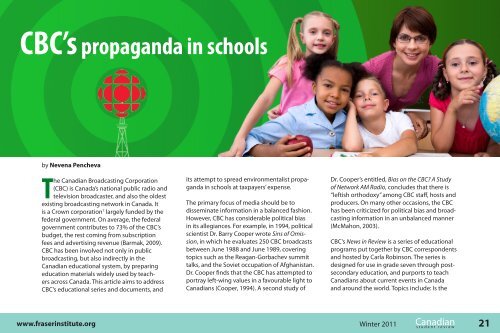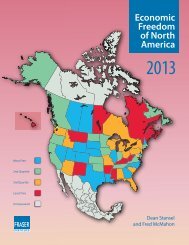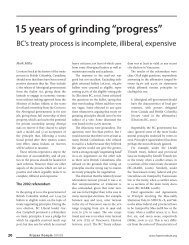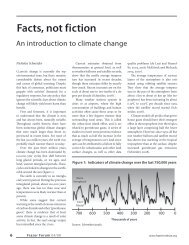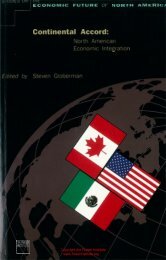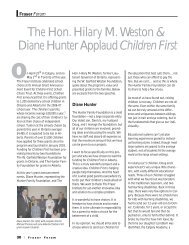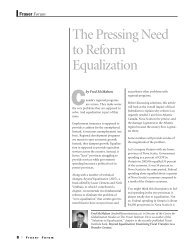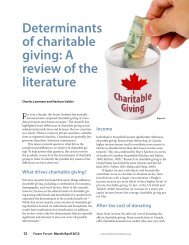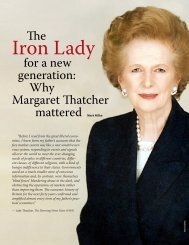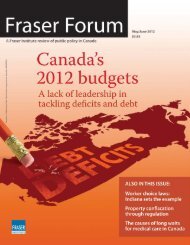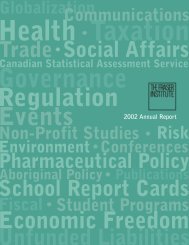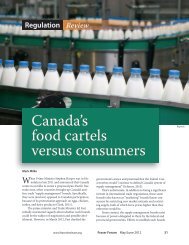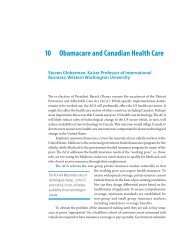CBC's propaganda in schools - Fraser Institute
CBC's propaganda in schools - Fraser Institute
CBC's propaganda in schools - Fraser Institute
Create successful ePaper yourself
Turn your PDF publications into a flip-book with our unique Google optimized e-Paper software.
CBC’s <strong>propaganda</strong> <strong>in</strong> <strong>schools</strong><br />
by Nevena Pencheva<br />
The Canadian Broadcast<strong>in</strong>g Corporation<br />
(CBC) is Canada’s national public radio and<br />
television broadcaster, and also the oldest<br />
exist<strong>in</strong>g broadcast<strong>in</strong>g network <strong>in</strong> Canada. It<br />
is a Crown corporation 1 largely funded by the<br />
federal government. On average, the federal<br />
government contributes to 73% of the CBC’s<br />
budget, the rest com<strong>in</strong>g from subscription<br />
fees and advertis<strong>in</strong>g revenue (Barmak, 2009).<br />
CBC has been <strong>in</strong>volved not only <strong>in</strong> public<br />
broadcast<strong>in</strong>g, but also <strong>in</strong>directly <strong>in</strong> the<br />
Canadian educational system, by prepar<strong>in</strong>g<br />
education materials widely used by teachers<br />
across Canada. This article aims to address<br />
CBC’s educational series and documents, and<br />
www.fraser<strong>in</strong>stitute.org<br />
its attempt to spread environmentalist <strong>propaganda</strong><br />
<strong>in</strong> <strong>schools</strong> at taxpayers’ expense.<br />
The primary focus of media should be to<br />
dissem<strong>in</strong>ate <strong>in</strong>formation <strong>in</strong> a balanced fashion.<br />
However, CBC has considerable political bias<br />
<strong>in</strong> its allegiances. For example, <strong>in</strong> 1994, political<br />
scientist Dr. Barry Cooper wrote S<strong>in</strong>s of Omission,<br />
<strong>in</strong> which he evaluates 250 CBC broadcasts<br />
between June 1988 and June 1989, cover<strong>in</strong>g<br />
topics such as the Reagan-Gorbachev summit<br />
talks, and the Soviet occupation of Afghanistan.<br />
Dr. Cooper f<strong>in</strong>ds that the CBC has attempted to<br />
portray left-w<strong>in</strong>g values <strong>in</strong> a favourable light to<br />
Canadians (Cooper, 1994). A second study of<br />
Dr. Cooper’s entitled, Bias on the CBC? A Study<br />
of Network AM Radio, concludes that there is<br />
“leftish orthodoxy” among CBC staff, hosts and<br />
producers. On many other occasions, the CBC<br />
has been criticized for political bias and broadcast<strong>in</strong>g<br />
<strong>in</strong>formation <strong>in</strong> an unbalanced manner<br />
(McMahon, 2003).<br />
CBC’s News <strong>in</strong> Review is a series of educational<br />
programs put together by CBC correspondents<br />
and hosted by Carla Rob<strong>in</strong>son. The series is<br />
designed for use <strong>in</strong> grade seven through postsecondary<br />
education, and purports to teach<br />
Canadians about current events <strong>in</strong> Canada<br />
and around the world. Topics <strong>in</strong>clude: Is the<br />
W<strong>in</strong>ter 2011<br />
Canadian<br />
s t u d e n t r e v i e w<br />
21
ecession really over?, Afghanistan and the<br />
rights of women, Canada and the stranded<br />
Canadians, and many others. An exam<strong>in</strong>ation<br />
of some of the material compiled by CBC’s<br />
News <strong>in</strong> Review exposes a troubl<strong>in</strong>g bias that<br />
conflicts with the network’s status as a Crown<br />
corporation. Examples of CBC’s <strong>propaganda</strong> are<br />
particularly evident <strong>in</strong> the network’s News <strong>in</strong><br />
Review materials related to global warm<strong>in</strong>g.<br />
The <strong>in</strong>formation presented is primarily derived<br />
from commentators who are strong proponents<br />
that man-made greenhouse gas emissions<br />
cause global warm<strong>in</strong>g, deny<strong>in</strong>g that<br />
science is not settled on this topic. For example,<br />
Bryan Walsh of Time magaz<strong>in</strong>e encourages<br />
people to visit an environmentalist website<br />
because this is their last chance to see the<br />
“polar world” due to melt<strong>in</strong>g sea ice (Walsh,<br />
2008). However, the extent of sea ice <strong>in</strong> the<br />
Arctic fluctuates naturally, and has both <strong>in</strong>creased<br />
and decreased <strong>in</strong> recent years<br />
(Asher, 2008).<br />
The article Mak<strong>in</strong>g Money by Go<strong>in</strong>g Green<br />
relies heavily on the claim that human activity<br />
is caus<strong>in</strong>g the vast majority of global warm<strong>in</strong>g<br />
despite recent research show<strong>in</strong>g that this may<br />
not be the case (Scafetta, 2010; Svensmark et<br />
al., 2007). The author praises cap-and-trade as<br />
a viable regulatory strategy cit<strong>in</strong>g estimates by<br />
the US Environmental Protection Agency that<br />
the cost to the economy will not exceed 1% of<br />
www.fraser<strong>in</strong>stitute.org<br />
CBC should dissem<strong>in</strong>ate more scientific facts and less bias<br />
GDP growth between 2010 and 2030 (News <strong>in</strong><br />
Review, 2008a). But the economic impact of the<br />
cap-and-trade bill is highly controversial. The<br />
Heritage Foundation, for example, has estimated<br />
the cost to be $393 billion annually between<br />
2012 and 2035 (approximately 3% of GDP<br />
accord<strong>in</strong>g to IMF figures), and totall<strong>in</strong>g $9.4<br />
trillion with a net loss of 1,145,000 jobs<br />
(Campbell and Kreutzer, 2009). Furthermore,<br />
the article states that the European capand-trade<br />
system has been very successful<br />
<strong>in</strong> <strong>in</strong>creas<strong>in</strong>g energy efficiency. This po<strong>in</strong>t is<br />
unsubstantiated. Most of the large sources of<br />
emissions <strong>in</strong> the European Union were either<br />
exempted or granted free emissions allowances,<br />
and there is no evidence to show how<br />
this led to <strong>in</strong>creases <strong>in</strong> energy efficiency<br />
(Johansson, n.d.).<br />
Moreover, some of the data <strong>in</strong> the CBC<br />
curriculum materials is erroneous.<br />
Accord<strong>in</strong>g to Mak<strong>in</strong>g Money by Go<strong>in</strong>g<br />
Green, Sweden successfully reduced emissions<br />
with the help of its carbon tax and its per<br />
capita GDP is still three times that of the United<br />
States. As a result, Sweden is held up as an<br />
example of successful implementation of<br />
a carbon tax without affect<strong>in</strong>g economic<br />
growth (NiR, 2008). However, there is currently<br />
disagreement on how much emissions <strong>in</strong><br />
Sweden have changed and the actual contribution<br />
of the carbon tax (Sumner et al., 2009).<br />
Furthermore, accord<strong>in</strong>g to the CIA World Fact<br />
W<strong>in</strong>ter 2011<br />
Canadian<br />
s t u d e n t r e v i e w<br />
22
Book, the United States’ per capita GDP <strong>in</strong> 2008<br />
was $48,100 <strong>in</strong> nom<strong>in</strong>al terms (adjusted for<br />
purchas<strong>in</strong>g power parity), while Sweden’s was<br />
$38,600 (CIA, 2010).<br />
Another article Putt<strong>in</strong>g a Tax on Carbon<br />
claims that Germany decreased carbon<br />
dioxide emissions by 20 million tonnes<br />
<strong>in</strong> 2003 as a result of high taxes on electricity,<br />
gasol<strong>in</strong>e, fossil fuel, and natural gas (NiR,<br />
2008b). However, accord<strong>in</strong>g to the United<br />
Nations Framework Convention on Climate<br />
Change (UNFCCC), greenhouse gas emissions<br />
<strong>in</strong> Germany actually <strong>in</strong>creased by 5.7 million<br />
tonnes (UNFCCC, 2006). Furthermore, the CBC<br />
also asserts that the <strong>in</strong>troduction of carbon<br />
taxes <strong>in</strong> certa<strong>in</strong> European countries has been<br />
very successful <strong>in</strong> reduc<strong>in</strong>g their CO 2 emissions.<br />
This claim is <strong>in</strong>correct as well. F<strong>in</strong>land was<br />
the first country to <strong>in</strong>troduce a carbon tax <strong>in</strong><br />
1990, but its GHG emissions slightly <strong>in</strong>creased<br />
between 1990 and 2000, and <strong>in</strong> 2007 they are<br />
www.fraser<strong>in</strong>stitute.org<br />
16.8% higher than <strong>in</strong> 1990<br />
(UNFCCC, 2009). The Netherlands<br />
and Norway, the next<br />
European countries to follow<br />
with a carbon tax, shared a<br />
similar fate. The greenhouse<br />
gas emissions of the Netherlands<br />
and Norway are 8.7%<br />
and 29.2% higher than<br />
1990 levels, respectively<br />
(UNFCCC, 2009).<br />
The article The Copenhagen<br />
Climate Change Summit places outright blame<br />
on the United States and Ch<strong>in</strong>a for the failure<br />
of conference delegates to reach an agreement<br />
on b<strong>in</strong>d<strong>in</strong>g emissions reduction targets<br />
(NiR, 2009). But, given the enormous emission<br />
reductions recommended by the UN, and the<br />
huge economic cost associated with them, no<br />
major country was will<strong>in</strong>g to sacrifice its citizens’<br />
well-be<strong>in</strong>g—particularly <strong>in</strong> light of recent<br />
revelations of fraud and deceit on the part of<br />
the researchers whose work is most often cited<br />
by proponents of the alarmist view (Katz, 2010).<br />
The CBC’s “green” bias is further evident <strong>in</strong><br />
its treatment of Canada’s oil sands. The same<br />
article claims that produc<strong>in</strong>g a s<strong>in</strong>gle barrel of<br />
oil from the oil sands requires between two to<br />
five barrels of water. However, the Canadian<br />
Association of Petroleum Producers (CAPP)<br />
reports that the water use has decl<strong>in</strong>ed to half<br />
a barrel for each recovered barrel of bitumen, 2<br />
which is a significant efficiency improvement<br />
(CAPP, 2009).<br />
The educational materials that the CBC correspondents<br />
have prepared show a strong bias<br />
<strong>in</strong> favour of the liberal view on climate change.<br />
The material is presented such that it shapes<br />
the students’ op<strong>in</strong>ions <strong>in</strong> a way favourable to<br />
the political agenda endorsed by the CBC. The<br />
CBC correspondents should try to present accurate<br />
<strong>in</strong>formation and rely on scientific facts.<br />
Notes<br />
1 A Crown corporation is a fully or partially funded<br />
corporation established by the federal government <strong>in</strong><br />
Canada..<br />
2 Accord<strong>in</strong>g to Alberta’s Department of Energy, to<br />
produce a barrel of synthetic crude oil, 1.17 barrels of<br />
bitumen are required. Therefore, to be precise, a barrel<br />
of oil requires 0.58 barrels of water (Government of<br />
Alberta, 2010).<br />
References<br />
Alberta, Department of Energy (2010). About<br />
Oil Sands: Facts and Statistics. ,<br />
as of March<br />
23, 2010.<br />
Asher, Michael (2008, September 3). Arctic<br />
Sees Massive Ga<strong>in</strong> <strong>in</strong> Ice Coverage. Daily Tech.<br />
,<br />
as of March 25, 2010.<br />
W<strong>in</strong>ter 2011<br />
Canadian<br />
s t u d e n t r e v i e w<br />
23
Barmak, Sarah (2009, March 15). Time to Reth<strong>in</strong>k<br />
CBC Fund<strong>in</strong>g? Star. , as of March<br />
11, 2010.<br />
Campbell, Karen, and David Kreutzer (2009, June<br />
25). Waxman-Markey Global Warm<strong>in</strong>g Bill: Economic<br />
Impact by Congressional District. ,<br />
as of March 11, 2010.<br />
Canadian Association of Petroleum Producers<br />
(2009). Environmental Challenges and Progress<br />
<strong>in</strong> Canada’s Oil Sands. , as of March 11,<br />
2010.<br />
Central Intelligence Agency (2010). The World<br />
Factbook. ,<br />
as of March 22,<br />
2010.<br />
Cooper, Barry, Lydia Miljan, and Maria Vigilante<br />
(1986). Bias on the CBC - A Study of Network AM<br />
Radio. Orig<strong>in</strong>al version of the Report presented<br />
to the Canadian Communications Association.<br />
Cooper, Barry (1994). S<strong>in</strong>s of Omission. University<br />
of Toronto Press.<br />
Johansson, Bengt (n.d.). Economic Instruments<br />
<strong>in</strong> Practice 1: Carbon Tax <strong>in</strong> Sweden. ,<br />
as of March 23, 2010.<br />
www.fraser<strong>in</strong>stitute.org<br />
Katz, Diane (2010). Global Warm<strong>in</strong>g on Trial.<br />
<strong>Fraser</strong> Forum (March). <strong>Fraser</strong> <strong>Institute</strong>: 6-9.<br />
McMahon, Fred (2003). The Incentives Fac<strong>in</strong>g<br />
Public Broadcasters. <strong>Fraser</strong> Forum (October).<br />
<strong>Fraser</strong> <strong>Institute</strong>: 11-13.<br />
News <strong>in</strong> Review (2008a). Mak<strong>in</strong>g Money by Go<strong>in</strong>g<br />
Green. (May): 43-55. , as of March 11, 2010.<br />
News <strong>in</strong> Review (2008b). Putt<strong>in</strong>g a Tax on Carbon.<br />
(September): 6-18. , as of March 11, 2010.<br />
News <strong>in</strong> Review (December 2009). The Copenhagen<br />
Climate Change Summit. ,<br />
as of<br />
March 11, 2010.<br />
Scafetta, Nicola (2010). Empirical Evidence for<br />
Celestial Orig<strong>in</strong> of the Climate Oscillations and<br />
its Implications. Journal of Atmospheric and<br />
Solar-Terrestrial Physics 72,13: 951-970.<br />
Sumner, Jenny, Lori Bird, and Hillary Smith<br />
(2009). Carbon Taxes: A Review of Experience and<br />
Policy Design Considerations. , as of March 26, 2010.<br />
Svensmark, Henrik (2007). Cosmoclimatology:<br />
A New Theory Emerges. Astronomy & Geophysics<br />
48,1: 1.18-1.24.<br />
United Nations Framework Convention on<br />
Climate Change (2006). GHG Data 2006: Highlights<br />
from Greenhouse Gas Emissions Data for<br />
1990-2004 for Annex I Parties. ,<br />
as of March 11, 2010<br />
United Nations Framework Convention on Climate<br />
Change (2009). National Greenhouse Gas<br />
Inventory Data for the Period 1990-2007. , as of March 22, 2010.<br />
Walsh, Bryan (2008, February 22). Global<br />
Warm<strong>in</strong>g, Up Close and Personal. Time.<br />
,<br />
as of March 22,<br />
2010.<br />
W<strong>in</strong>ter 2011<br />
Nevena Pencheva received her<br />
Master’s <strong>in</strong> economics from<br />
Simon <strong>Fraser</strong> University. She<br />
was an <strong>in</strong>tern <strong>in</strong> the <strong>Fraser</strong><br />
<strong>Institute</strong>’s Calgary office, and<br />
currently works for a consult<strong>in</strong>g<br />
company <strong>in</strong> Toronto.<br />
Canadian<br />
s t u d e n t r e v i e w<br />
24


